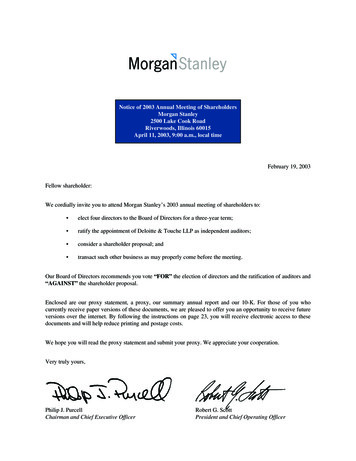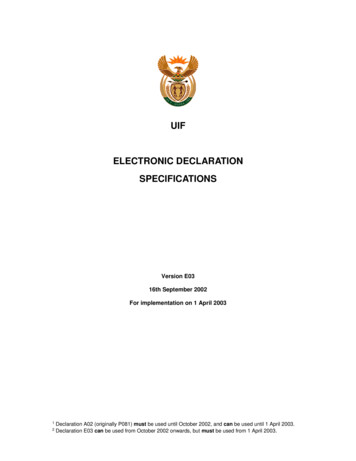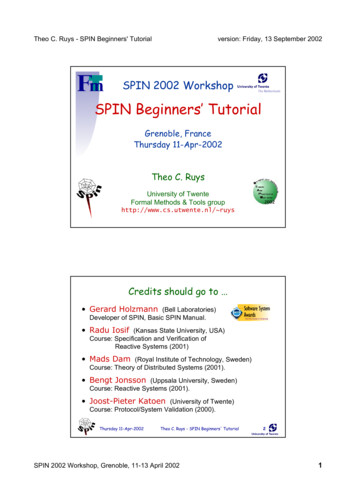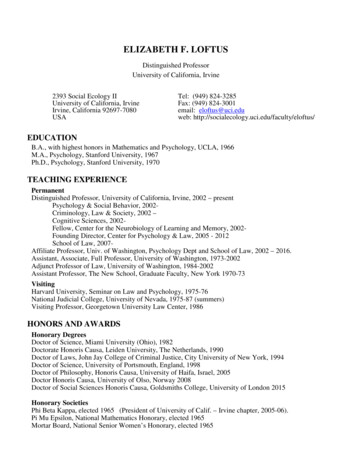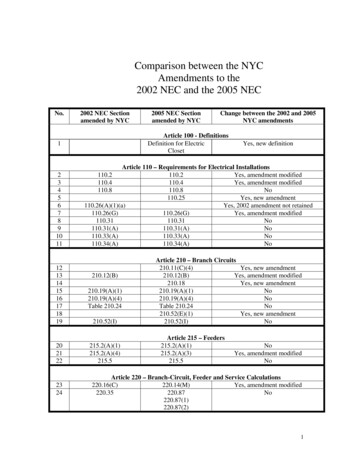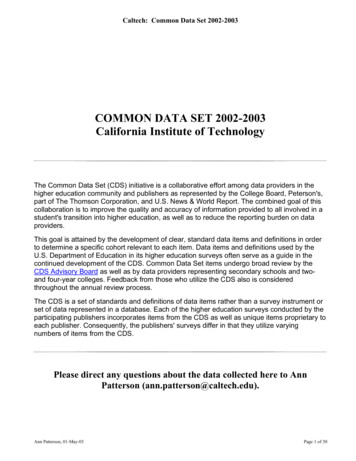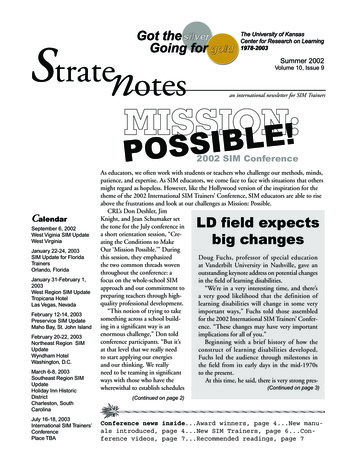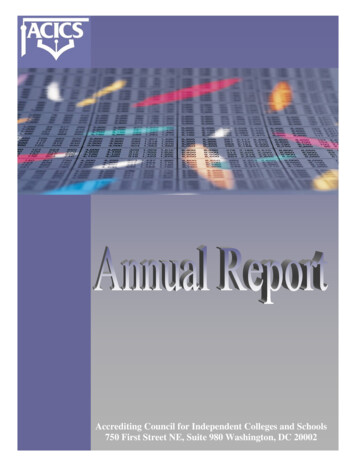
Transcription
2002-2003 Annual ReportAccrediting Council for Independent Colleges and SchoolsAccrediting Council for Independent Colleges and Schools750 First Street NE, Suite 980 Washington, DC 20002
2003-2004 Annual ReportAccrediting Council for Independent Colleges and SchoolsTable of Contents2003-2004 Annual ReportLetter from Dr. Steven A. Eggland, ACICS Executive Director .3Letter from Mr. Dennis Kerr, ACICS Board Chair .4Accrediting Council for Independent Colleges and Schools 5ACICS Board of Directors and Commissioners . 6Statements of Value . .8Summary of ACICS Activities 2003-2004 10Summary of Accreditation Visits Conducted 1999-2004 .11Summary of Council Actions 1999-2004 .12Average Accreditation Grant Length 1999-2004 13Institutional Characteristics of Accredited Institutions .14ACICS-Accredited Institutions .15Former ACICS Commissioners 22ACICS Executive Directors 23ACICS Staff 242003-2004 Audited Financial Statements /AuditedFinal2.pdf)Independent Auditor’s ReportBalance SheetsStatements of Activities and Changes in Net AssetsStatements of Cash FlowsNotes to Financial Statements2
ACICS is pleased to present you with a summary of the Council’sactivities during the fiscal year including our most recent auditedfinancial report for the organization. The 2003-2004 Annual Reportprovides our accredited institutions and the public with an overviewof our four statements of value intended to express what is importantto ACICS within the context of Reauthorization of the HigherEducation Act (HEA). The Council believes that institutions must beaccountable to rigorous educational, administrative and fiscalstandards. We also believe that the ease of transfer of credits willfoster a more equitable higher education community and that wemust continue to foster distance education strategies, student learningoutcomes, and peer review in the accreditation of institutions ofhigher education.As evidence of our work on behalf of our accredited institutions andthe U. S. Department of Education, we provide you herewith asummary of the evaluation visits conducted at institutions for the pastfive years and the final outcomes of those evaluation visits. Councilstaff continues to schedule approximately 100 evaluation visits andconsultations during each of three, two-month travel cycles. Basedon positive Council actions, institutions are continuing to experienceoverall growth and expansion of programs and services. There is even more good news to report. ACICS is proud toannounce that we now may award a maximum grant length of eight years. For many years, the Council awarded grantsof accreditation from one to six years in length. An eight-year grant of accreditation acknowledges and rewards thoseinstitutions that have demonstrated an understanding of and commitment to our accreditation standards.As you will see from the characteristics of ACICS-accredited institutions, total enrollment has steadily increased overthe years to more than 430,000 students. Like the increase in student enrollment, the list of ACICS-accreditedinstitutions also has continued to expand. A current list of accredited institutions, by state, is also provided in thisreport.A review of the Financial Report will indicate that we are healthy in the fiscal realm as well. Both our operatingoutcomes and our financial reserves have shown positive results. The ACICS staff is largely responsible for this goodnews.Once again, the full complement of dedicated ACICS staff will continue to provide support to you and to those whoassure and enhance the quality of institutions accredited by ACICS. It is a privilege to serve as your chiefadministrative officer and I look forward to another successful year.Respectfully submitted,Steven A. Eggland, Ph.D.ACICS Executive Director3
It has been my honor and privilege to serve as chair of the Board ofDirectors during a remarkable year for ACICS. I am continuallyimpressed by the commitment and dedication of your Council, theExecutive Director Dr. Steven A. Eggland, and each staff member inthe Council office. Let me assure you that each individual iscommitted to the mission of ACICS, which is to advance educationalexcellence through the accreditation process of quality assurance andenhancement as well as ethical business and educational practices.After a busy year, we present you with the 2003-2004 Annual Report asevidence of our accomplishments. Operating on a conservative budget,the Council has produced a balanced budget, continues to monitor thelong-range strategic plan, and reaffirmed our respected status in highereducation.ACICS has initiated an agreement with The National Court ReportersAssociation, and we continue to pursue recognition with The AmericanAssociation of Medical Assistants. We will continue to pursueopportunities that benefit our institution and the students attendingthem.Another exciting project underway and spearheaded by ACICS is the Higher Education Transfer Alliance (HETA),formerly, the ACICS Transfer Alliance. The issue of transfer of credit remains an important challenge for students whograduate and wish to continue their education. ACICS’s strategy is to develop a Transfer Alliance or institutionalpartnership that would agree on transfer criteria. Institutions participating in the Transfer Alliance would then accept,in transfer, degrees and credits earned by students from other Transfer Alliance partners. I strongly encourage ouraccredited institutions to participate in the Transfer Alliance.ACICS presented The First Annual Distinguished Service Award to Dr. Lloyd Garrison, at the June, 2004 AnnualMeeting. This award is given annually to a person who has served ACICS or a public educator who made significantcontributions to the career college sector. We have initiated a Public Relations program to present positive publicrelations information throughout the year ahead.ACICS continues to grow, accrediting new institutions and new programs. I urge all of our institutions to participate inthe Annual Meeting in June 2005. We had a record number of institutions participating in the June, 2004 meeting inOrlando. Please send us suggestions of interest to our institutions so we can continue to improve on the number ofcolleges attending and participating in worthwhile workshops.The ACICS staff continues to provide our accredited institutions with outstanding opportunities to participate inACICS-sponsored workshops. I encourage you to participate in any of the workshops to learn more about accreditationand enhance the quality of your institution. Workshops also provide an excellent venue to meet the entire staff at theCouncil office and to network with colleagues.Again, it has been an exciting and productive year. I would like to thank the Commissioners for their effort andsupport of ACICS and our sector. I also commend the entire staff at ACICS for their hard work and commitment.Most importantly, I thank the Council and ACICS staff for their support of our students.Sincerely,Dennis KerrACICS Board of Directors4
Accrediting Council for Independent Colleges and SchoolsACICS, a non-profit education corporation, was foundedas the National Association of Accredited CommercialSchools (NAACS) in 1912, and has been recognized bythe United States Secretary of Education since 1956, justfour years after the recognition process was introduced.ACICS is an independent and autonomous nationalaccrediting body that accredits institutions of highereducation offering programs of study through themaster’s degree level. The scope of our recognition bythe Secretary is defined as accreditation of privatepostsecondary institutions offering certificates ordiplomas and postsecondary institutions offeringassociate’s, bachelor’s, or master’s degrees in programsthat are designed to train and educate persons for careersor professions where business applications or doctrines,supervisory or management techniques, professional orparaprofessional applications, and other business-relatedapplications support or constitute the career.The Council is composed of two commissions and anelected Board of Directors. The two commissions aretheCommissiononPostsecondarySchoolAccreditation (COPSA) and the Commission onCollege Accreditation (COCA). COPSA is responsiblefor postsecondary institutions that offer certificates,diplomas, and occupational associate’s degrees, andCOCA assesses collegiate institutions that offeracademic associate’s, bachelor’s, and master’s degrees.The Secretary’s re-recognition for the maximum fiveyear period confirms that ACICS is “a reliable authorityas to the quality of education or training offered by theinstitutions of higher education programs it accredits.”ACICS accredits over 600 institutions in this country andabroad, which last year enrolled over 400,000 students.Over sixty-five percent of these ACICS-accreditedinstitutions are degree-granting colleges and schools.Commissioners include representatives from ACICSaccredited institutions or other sectors of highereducation and the general public. Public members maycome from business, industry, or the professions. Eachcommission consists of seven commissioners, at leastthree of whom are elected by the membership and atleast four of whom are appointed. At least one of thefour appointed commissioners on each commissionmust be a public member.The Board of Directors is composed of the CouncilChair, the Chair-Elect of the Council, the COCA Chair,the COPSA Chair, a Commissioner-at-Large, and theExecutive Director.The Council Chair and theCommissioner-at-Large are selected by the Council.The COPSA and COCA chairs are selected by theirrespective commissions. At least one of the Directorsmust be a public member.5
Board of DirectorsCommission on Postsecondary SchoolAccreditation (COPSA)Mr. Dennis KerrChairmanDennis Kerr Enterprises, Inc.Baton Rouge, LouisianaChairTerm expires 2004 – Elected MemberMr. Lowell FrameSenior Vice President of AcademicsIndiana Business CollegeIndianapolis, IndianaChairTerm expires 2006 – Elected MemberDr. David J. HyslopProfessorBusiness Education DepartmentBowling Green State UniversityBowling Green, OhioChair-ElectTerm expires 2005 – Appointed PublicMr. George P. BlountVice PresidentGlobal Business InstituteNew York, New YorkTerm expires 2005 – Elected MemberDr. James HuttonChief Executive OfficerVirginia CollegeBirmingham, AlabamaChair, Commission on College AccreditationTerm expires 2006 – Elected MemberMr. Lowell FrameSenior Vice President of AcademicsIndiana Business CollegeIndianapolis, IndianaChair, Commission on Postsecondary SchoolAccreditationTerm expires 2006 – Elected MemberMr. George L. PryPresidentThe Art Institute of PittsburghPittsburgh, PennsylvaniaCommissioner-At-LargeTerm expires 2005 – Appointed MemberMs. Janet BonsallDirector of Curriculum DevelopmentBradford Schools, Inc.Charlotte, North CarolinaTerm expires 2004 – Appointed MemberDr. Joyce J. CatonSenior Lecturer (Retired)Education/Special Education DepartmentFontbonne UniversitySt. Louis, MissouriTerm expires 2006 - Replaced Appointed MemberMs. Patricia FischerVice PresidentDorsey Business SchoolMadison Heights, MichiganTerm expires 2005 – Appointed MemberDr. Sandra YelvertonEducation Specialist (Retired)Alabama Department of EducationMontgomery, AlabamaTerm expires 2004 – Appointed MemberDr. Steven A. EgglandExecutive DirectorAccrediting Council for IndependentColleges and SchoolsWashington, DCEx Officio MemberAppointed February 1, 20016
Commission on College Accreditation (COCA)Dr. James HuttonChief Operating OfficerVirginia CollegeBirmingham, AlabamaChairTerm expires 2006 – Elected MemberMr. David M. LuceRegulatory and Legislative Affairs RepresentativeITT Educational Services, Inc.Carmel, IndianaTerm expires 2005 – Elected MemberDr. Carmen Zoraida ClaudioPresident/CEONational College of Business & TechnologyBayamon, Puerto RicoTerm expires 2005 – Appointed MemberMr. George L. PryPresidentThe Art Institute of PittsburghPittsburgh, PennsylvaniaTerm expires 2005 – Appointed MemberMs. Anna M. CountsDirector of Institutional Compliance and AccreditationNational College of Business & TechnologyFlorence, KentuckyTerm expires 2006 – Appointed MemberMr. Glenn SullivanExecutive Vice PresidentSullivan Colleges SystemLouisville, KentuckyTerm expires 2004 – Replaced Elected MemberDr. David J. HyslopProfessorBusiness Education DepartmentBowling Green State UniversityBowling Green, OhioTerm expires 2005 – Appointed Public7
Statements of ValueThe Council has promulgated four statements of value, which are intended to express what is important to ACICS withinthe context of Reauthorization of the Higher Education Act (HEA).I.the appropriateness of students’ transfer creditfrom one institution to another.Accreditation and AccountabilityThe Council believes that institutions must beaccountable to rigorous educational, administrative,and fiscal standards.ACICS also believes that the issue of transfer ofcredit needs to be solved proactively within theaccreditation community before it is solvedthrough legislation. Leadership in this area wouldinclude addressing issues such as needlesscoursework duplication and how such duplicationcreates a cumbersome system of waste of taxpayermonies tied to Title IV student aid programs.ACICS emphasizes educational activities,making certain institutions are effectivelyorganizing the educational experience andeffectively educating, graduating, and placingstudents.ACICS also believes that accrediting agenciesrecognized by the U.S. Department of Educationand CHEA should presume that credits earned atsuch institutions are of similar quality.Accountability is operationalised throughstandards on institutional tracking of students’satisfactory academic progress, institutionaleffectiveness planning girded in criteria, andretention and placement reporting that requiresinstitutions to account for student achievementleading to gainful chingandThe Council believes that the higher educationcommunity should continue to foster the development ofdistance education strategies, while assuring parallelmeasures of success and expecting similar studentlearning outcomes in a distance environment comparedto residential modes of educational delivery.In addition, ACICS believes accrediting agenciesmust monitor fiscal soundness by askingaccredited institutions to produce annual audits,periodic fiscal reports, and independent financialstatements.Institutions not meeting thestandards may be placed on a reporting regime,or asked to show cause why their accreditationshould not be suspended, conditioned, or denied.Standards in the area of distance education andnontraditional teaching and learning environmentsmust be reflective of the innovative methods fordelivering education and opening opportunities forstudents who may not have been able to pursuepostsecondary training or higher education in thepast.ACICS also believes that accrediting bodiesshould provide quality enhancement services toaccredited institutions and evaluators to promotecontinual institutional improvement and insurecompliance with accreditation standards throughsubstantive workshops, communications, andtraining.Quality enhancement must beencouraged for all institutions and mandated forinstitutions not meeting criteria.ACICS believes that if institutions are offeringhigh quality educational curricula and have provenrecords of quality in educational activities,administration, and fiscal responsibility, thendistance learning should be treated as any othermode of delivery – fully vested in terms of TitleIV eligibility. We believe ACICS’ standards andevaluation practices in assuring quality in distancedelivery and learning are comprehensive andappropriate.II. Accreditation and Transfer of CreditThe Council believes that ease of transfer of students’academic credits is critical to fostering an open,equitable, and competency-based higher educationcommunity.ACICS believes that factors other than origin ofaccreditation should be considered in assessing8
IV.Accreditation, Peer Review, and the FederalGovernmentThe relationship is cost-effective, rooted in peerand expert evaluation, and signals to students andthe public that institutions and/or programs aremeeting relevant and comprehensive qualitystandards. Standards may necessarily addresscommon denominators, but in the Council’sperspective the accreditation process fosters aculture of excellence in assessment andaccountability.The Council believes in the inherent and historicallyvalidated utility of peer review in the accreditation ofinstitutions of higher education.The relationship between the accrediting bodiesand the federal government is almost a halfcentury old. ACICS believes it is important tounderstand, revisit, and recommit to thepartnership in which the relationship developed.A system of quality assurance was needed toinsure that veteran, and by extension, taxpayermonies were well spent. Within a private-publicparadigm, accreditation has come to symbolize,in a substantive manner, that accreditedinstitutions and/or programs are of anappropriate level of quality. Over time this levelof quality has become meaningful to educators,students, and the public.ACICS asserts that periodic evaluation, enteredinto voluntarily by institutions and their peers,enhances the quality of the educational processand demonstrates that the evaluative environmentof peer review is superior to direct federal and/orstate regulation.ACICS appreciates the opportunity to communicatethese statements of value to the readers of our2003-2004 Annual Report. Thank you for your time andconsideration.9
Summary of ACICS Activities: July 2003 – June 2004Initial Inquiries38Requests for Initial Applications15Applications Withdrawn/Expired0Initial Applications16Branch Applications22Learning Site Applications13Redesignation of Campus1Main Campus Closings (Voluntary)8Branch Campus Closings (Voluntary)3Accreditation Revoked1Voluntary Withdrawal of Accreditation4Change of Ownership/Control60Change of Name41Change of Location33Complaints Reported33Complaints Closed16Adverse Information Reported21Adverse Information Closed21New Program Applications945Program Revisions221310
Summary of Accreditation Visits Conducted: January 1999 – June 2004TYPE OF W04S04F04TOTALInitial Resource32432012445724233-51Initial 828243929463453443067445439703Branch n71251723611658781097-114Learning ss 754918105New Program0331911734122827171218191648264244413Change ofOwnership55674121766143321010137121Special Visit04085771002111000138FACT 00000010117Pre-hearing 95941671391461192020CredentialInclusionW Winter Visits S Spring Visits F Fall Visits11
Summary of Council Actions: 1999 – 2004ACTION199920002001200220032004*TOTALInitial Grant32121615773New Grant698268766639400Branch Inclusion19151415221297New Specialized Program297569515232308New Credential Readiness113522343110143New Credential Inclusion21082221568Recognized ANAChange of Ownership14193591024111Nontraditional EducationNA410034211792211141178795813Show Cause81711871364Continue Show Cause04462016Vacate Show Cause268102735Deny (appealable)718452137New Specialized Program Denial(appealable)0200002Continue Denial0171132033Continue New Specialized ProgramDenial0300003Affirm includes voluntary as of 2002)NA01123218TOTAL3735433833753252253APPROVAL ACTIONSDEFERRAL ACTIONSDeferralSHOW CAUSE ACTIONSNEGATIVE ACTIONS* 2004 figures include actions only for the April and August 2004 Council meetings.12
Average Accreditation Grant Length: April 1999 – August 2004MEETINGINITIALGRANT*AVG. GRANTLENGTHNEWGRANTApril 199934.0344.4June 1999284.513.0August 199913.0343.9December 199923.0224.8TOTAL 1999343.6914.0April 200073.1214.5August 200032.6284.2December 2000NANA125.0TOTAL 2000102.8614.6April 2001NANA125.013.0234.8NANA264.513.0614.8August 2001December 2001TOTAL 2001April 2002AVG. GRANTLENGTHNANA183.3August 200223.0214.9December 200243.0375.0TOTAL 200263.0764.4April 2003113.0164.9August 200343.5254.8December 200313.0256.7TOTAL 2003163.2665.5April 200443.8277.2August 200432.3124.6** December 2004TOTAL 2004* Initial grants that are ‘subject to’ may become effective at subsequent meetings.** December 2004 data will be available after Jan. 3, 2005.13
Institutional Characteristics of Accredited Institutions(Based on 2003 Annual Institutional Reports received) ACICS institutions reported a total enrollment of 432,466 students. The median institutional enrollment was 534 students. The average institutional enrollment was 737 students. 70% of the institutions offered at least one degree program. The average verified student retention rate was 74.0%. The average verified placement rate was 76.5%. Over 51,000 graduates and completers were placed in their field of study. ACICS institutions employed over 18,700 faculty members. The top ten programs of study accounted for more than 56% of the total student enrollment. Institutions graduated more than 91,900 students from approved programs. Over 221,000 new students enrolled at accredited institutions.Top Ten ACICS Programs of Study by EnrollmentPROGRAMENROLLMENTMedical/Clinical Assistant43,203Information Technology37,484Business Administration and Management34,512Electrical Electronic and31,114Administrative Assistant18,657Computer dical Administrative Assistant15,392Computer Programming14,911Medical Office Assistant13,709Top Ten ACICS Programs of Study by Number OfferedPROGRAMNUMBER OF PROGRAMSAdministrative Assistant475Business Administration and Management461Accounting453Information Technology405Computer Systems Networking/Telecommunications364Medical/Clinical Assistant319Computer Programming266Medical Administrative Assistant213Legal Administrative Assistant180Legal Assistant/Paralegal17514
ACICS-Accredited Institutions - 644 (as of November 11, 2004)AlabamaGadsden Business College, AnnistonGadsden Business College, Rainbow CityITT Technical Institute, BirminghamPrince Institute of Professional Studies, MontgomeryVirginia College, BirminghamVirginia College, HuntsvilleVirginia College at Mobile, MobileVirginia College Technical, PelhamAlaskaCharter College, AnchorageArizonaInternational Institute of the Americas, MesaInternational Institute of the Americas, PhoenixInternational Institute of the Americas, West PhoenixInternational Institute of the Americas, TucsonArt Institute of Phoenix, The, PhoenixChaparral College, TucsonGolf Academy of Arizona, ChandlerITT Technical Institute, TempeITT Technical Institute, TucsonLamson College, TempeLong Technical College, PhoenixRemington College, TempeTucson College, TucsonTucson Design College, TucsonUniversity of Advancing Technology, TempeArkansasITT Technical Institute, Little RockCaliforniaAcademy of Art University, San FranciscoAmerican Institute of Health Sciences, Long BeachArt Institute of California-Orange County, The, Santa AnaArt Institute of California-Los Angeles, The, Santa MonicaArt Institute of California-San Francisco, The, San FranciscoBrooks College, Long BeachBrooks College, SunnyvaleBrooks Institute of Photography, Santa BarbaraBrooks Institute of Photography, VenturaBryan College of Court Reporting, Los AngelesBryman College, San BernardinoCalifornia Design College, Los AngelesCalifornia School of Culinary Arts, PasadenaCambridge Career College, Yuba CityColeman College, La MesaColeman College, San MarcosCourt Reporting Institute, San DiegoDesign Institute of San Diego, San DiegoEmpire College, Santa RosaEverest College, Rancho CucamongaFashion Careers College, San DiegoGolf Academy of San Diego, VistaInternational Technological University, Santa ClaraInstitute of Computer Technology, Los AngelesITT Technical Institute, AnaheimITT Technical Institute, HaywardITT Technical Institute, LathropITT Technical Institute, OxnardITT Technical Institute, Rancho CordovaITT Technical Institute, San BernardinoITT Technical Institute, San DiegoITT Technical Institute, Santa ClaraITT Technical Institute, SylmarITT Technical Institute, TorranceITT Technical Institute, West CovinaKensington College, Santa AnaLincoln University, OaklandMaric College, SacramentoMaric College, AnaheimMaric College, Panorama CityMonterey Park College, Monterey ParkMonterey Park College, StantonNational Hispanic University, San JoseNewschool of Architecture and Design, San DiegoNorthwestern Polytechnic University, FremontPacific States University, Los AngelesPremiere Career College, IrwindaleProfessional Golfers Career College, TemeculaRemington College, San DiegoRoss Business Institute, BurbankSage College, Moreno ValleySanta Barbara Business College, BakersfieldSanta Barbara Business College, Santa BarbaraSanta Barbara Business College, Santa MariaSanta Barbara Business College, VenturaSierra Valley Business College, FresnoSilicon Valley University, San JoseSouth Coast College, OrangeWest Coast University, Los AngelesWestwood College-Los Angeles, Los AngelesColoradoArt Institute of Colorado, The, DenverBlair College, Colorado SpringsDenver Academy of Court Reporting, WestminsterInstitute of Business & Medical Careers, Fort CollinsITT Technical Institute, ThorntonParks College, AuroraParks College, DenverRemington College, Colorado SpringsRemington College, LakewoodTeikyo Loretto Heights University, DenverConnecticutBranford Hall Career Institute, BranfordBranford Hall Career Institute, SouthingtonBranford Hall Career Institute, WindsorButler Business School, BridgeportConnecticut Training Center, East HartfordFox Institute of Business, West HartfordGibbs College, FarmingtonGibbs College, NorwalkGoodwin College, East HartfordRidley-Lowell Business & Technical Institute, New London15
(Continued)Sawyer School, HamdenSawyer School, HartfordStone Academy, HamdenStone Academy, WaterburyDistrict of ColumbiaStenotype Institute of Jacksonville, JacksonvilleStenotype Institute of Jacksonville, OrlandoVirginia College at Pensacola, PensacolaWebster College, HolidayWebster College, OcalaGulf Coast College, TampaPotomac College, WashingtonFloridaAngley College, DelandAngley College, OrlandoArt Institute of Fort Lauderdale, The, Fort LauderdaleCity College, CasselberryCity College, Fort LauderdaleCity College, GainesvilleCity College, MiamiCollege of Business & Technology, MiamiCooper Career Institute, West Palm BeachFlorida Career College, HialeahFlorida Career College, MiamiFlorida Career College, Pembroke PinesFlorida Career College-West Palm Beach, West Palm BeachFlorida Metropolitan University, (Pinellas) ClearwaterFlorida Metropolitan University, JacksonvilleFlorida Metropolitan University, LakelandFlorida Metropolitan University, MelbourneFlorida Metropolitan University, Orange ParkFlorida Metropolitan University, Orlando (North)Florida Metropolitan University, Orlando (South)Florida Metropolitan University, Pompano BeachFlorida Metropolitan University, (Brandon) TampaFlorida Metropolitan University, TampaFlorida Technical College, AuburndaleFlorida Technical College, DelandFlorida Technical College, JacksonvilleFlorida Technical College, OrlandoGolf Academy of the South, Altamonte SpringsHerzing College, Winter ParkInternational Academy of Design and Technology, OrlandoInternational Academy of Design and Technology, TampaITT Technical Institute, Fort LauderdaleITT Technical Institute, JacksonvilleITT Technical Institute, Lake MaryITT Technical Institute, MiamiITT Technical Institute, TampaJones College, JacksonvilleJones College, JacksonvilleJones College, MiamiKey College, Dania BeachLevin School of Health Care, Delray BeachNew England Institute of Technology at Palm Beach,West Palm BeachNorth Florida Institute, JacksonvilleNorth Florida Institute, Orange ParkOrlando Culinary Academy, OrlandoProfessional Golfers Career College-Orlando, Winter GardenSanford Brown Institute, JacksonvilleSanford Brown Institute, TampaSchiller International University, DunedinSouthern Technical Institute, OrlandoSouthwest Florida College, Fort MyersSouthwest Florida College, TampaGeorgiaAsher School of Business, NorcrossCareer Education Institute, MariettaCareer Education Institute, NorcrossGwinnett College, LilburnHerzing College, AtlantaITT Technical Institute, DuluthKerr Business College, AugustaWestwood College-Atlanta Midtown, AtlantaWestwood College-Atlanta Northlake, AtlantaHawaiiGolf Academy of Hawaii, KaneoheHawaii Business College, HonoluluRemington College, HonoluluIdahoBCRI Career Training, BoiseITT Technical Institute, BoiseIllinoisCareer Colleges of Chicago, ChicagoCollege of Office Technology, The, ChicagoCommonwealth Business College, MolineFox College, Oak LawnGem City College, QuincyHarrington College of Design, ChicagoInternational Academy of Design and Technology, ChicagoInternational Academy of Design and Technology, SchaumburgITT Technic
institutions are degree-granting colleges and schools. The Council is composed of two commissions and an elected Board of Directors. The two commissions are the Commission on Postsecondary School Accreditation (COPSA) and the Commission on College Accreditation (COCA). COPSA is responsible for postsecondary institutions that offer certificates,

